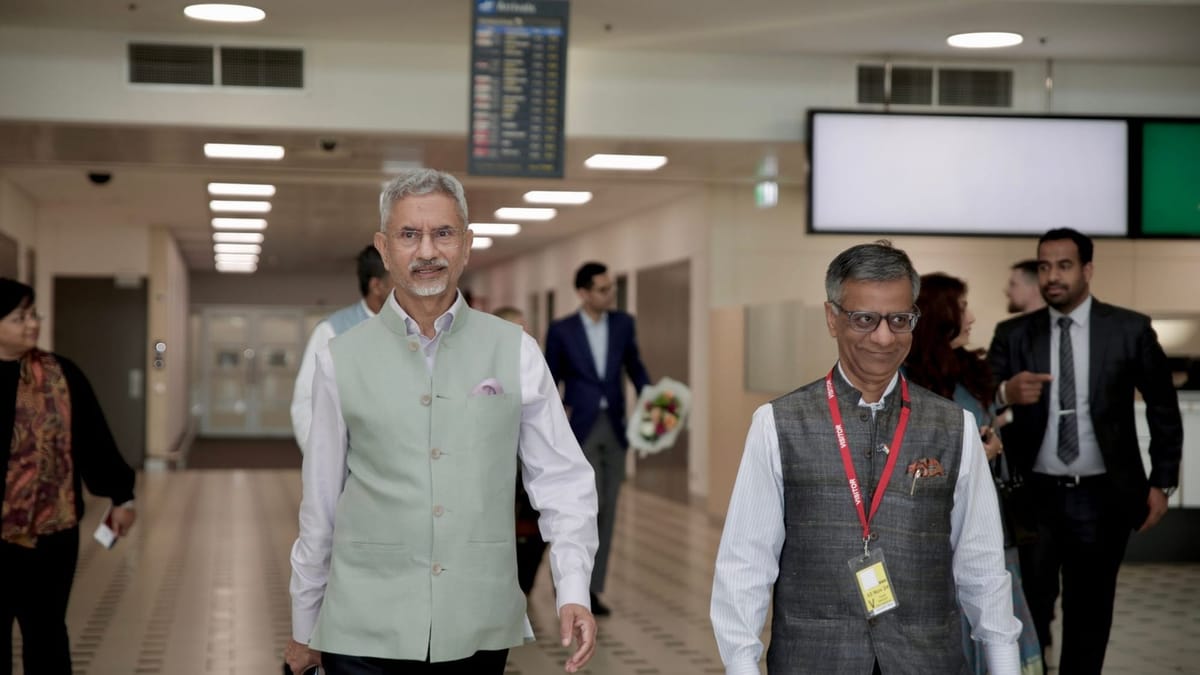
ModiWatch: On November 1, Prime Minister Narendra Modi extended his wishes to Madhya Pradesh, Karnataka, Kerala, Haryana, and Chhattisgarh on their formation days, highlighting Karnataka's cultural richness, Madhya Pradesh's natural resources, Chhattisgarh's folk traditions, Kerala's global influence, and Haryana's historical contributions to national development.
PM Modi condoled the passing of Dr. Bibek Debroy, Chair of the Economic Advisory Council to the Prime Minister (EAC-PM), lauding his contributions to India’s intellectual and policy landscape.
PM Modi received a call from Greek Prime Minister Kyriakos Mitsotakis, who congratulated him on his re-election and reviewed bilateral cooperation in trade, defence, shipping, and connectivity. They also discussed regional issues including the India-Middle East-Europe Economic Corridor (IMEEC) and developments in West Asia.
PM Modi congratulated Botswana’s new President, Duma Boko of the Umbrella for Democratic Change (UDC), and expressed eagerness to strengthen bilateral ties.
Sanctions, security talks, and alliances
U.S. sanctions target Indian firms over dual-use goods to Russia: The U.S. Treasury Department has sanctioned multiple Indian entities, including Ascend Aviation and Emsystech, for allegedly supplying dual-use goods and military equipment to Russia.
U.S. and India discuss defence cooperation amid Sikh separatist tensions: U.S. National Security Advisor Jake Sullivan and Indian counterpart Ajit Doval spoke about regional security and defence collaboration, including clean energy supply chains, as the U.S. expressed concerns over allegations involving Indian Home Minister Amit Shah targeting Sikh separatists in Canada.
Canada-India diplomatic rift deepens over allegations against Home Minister: India called Canada’s allegations against Home Minister Amit Shah “absurd and baseless,” warning of serious consequences for ties, as surveillance claims on Indian consular staff deepen the rift.
Fresh thaw in Sino-Indian ties as verification patrols confirmed in eastern Ladakh: India confirmed verification patrols with China at two key areas in eastern Ladakh, restoring pre-2020 conditions along the Line of Actual Control (LAC) following recent troop disengagement.
India-Saudi Arabia ties deepen with new trade, tech, and energy deals: Commerce Minister Piyush Goyal’s visit to Saudi Arabia concluded with new agreements on trade, digital infrastructure, and clean energy, urging investors to explore India's high-growth sectors and reinforcing economic ties between the two nations.
Mineral production and fuel prices increase
Mineral production rises, driven by iron ore, aluminium, and copper demand: India’s mineral production saw growth in FY 2024-25, with iron ore output up 5.5% year-on-year to 135 million metric tonnes (MMT), manganese by 6.2%, aluminium by 1.2%, and copper by 4.6%, due to strong demand in steel, energy, and construction sectors.
Jet fuel and commercial LPG prices rise amid global oil trends: The price of Aviation Turbine Fuel (ATF) increased by 3.3% to approximately $1,088.73 per kilolitre in New Delhi, while commercial liquefied petroleum gas (LPG) for hotels and restaurants rose by $0.75 per 19 kg cylinder, marking the fourth consecutive monthly hike in LPG prices.
Zebra Technologies eyes double-digit growth in e-commerce, logistics, and manufacturing: Zebra Technologies, a $4.58 billion U.S. firm, targets double-digit growth in India's e-commerce, logistics, and manufacturing sectors by 2025, driven by automation and real-time tracking demand.
Semiconductor firm Trasna sets up in Kerala: Ireland-based semiconductor company Trasna has inaugurated its new office at Technopark in Kerala, highlighting a shift in the state’s industrial landscape and creating opportunities for the local skilled workforce amid increasing international investments.
AI, space, and electric mobility
Jaishankar highlights global cooperation in AI and electric mobility: External Affairs Minister S. Jaishankar, during his visit to Australia, underscored India's commitment to global growth and cooperation in AI, electric mobility, and semiconductors.
Microsoft ramps up AI momentum with Copilot and skilling initiatives: Microsoft reports strong tech spending in India, driven by AI adoption and 'Copilot' success, alongside AI skilling programs set to train 2 million people.
Indian startups secure $12.2 billion funding: Indian startups have raised $12.2 billion across 119 deals this year, surpassing 2023's total funding, as the Union Cabinet approved a $120 million (₹1,000 crore) venture capital fund to fuel the space sector over the next five years under the Indian National Space Promotion and Authorization Center (IN-SPACe).
India’s first analog space mission simulates lunar habitat in Ladakh: The Indian Space Research Organisation (ISRO) has launched its first analog space mission in Ladakh, using a habitat equipped with life support systems to simulate interplanetary conditions, advancing plans for future Moon and Mars missions.
L&T eyes growth in aerospace amid space sector expansion: Larsen & Toubro Ltd (L&T), India's largest private-sector defence manufacturer, plans to expand its aerospace division following government moves to open the space industry to private firms.
Rajesh Kumar Singh is new Defence Secretary
Rajesh Kumar Singh appointed as Defence Secretary: Rajesh Kumar Singh, assumed his role as Defence Secretary, succeeding Giridhar Aramane, who retired on October 31.
India signs $59 million contract for first silent-class acoustic research ship: The Naval Physical and Oceanographic Laboratory (NPOL) has contracted Kolkata’s Garden Reach Shipbuilders and Engineers (GRSE) for the design and construction of an acoustic research ship, which will feature underwater surveillance technology for Anti-Submarine Warfare (ASW) applications, with delivery scheduled in three years.
Assembly elections
Jharkhand assembly elections: On November 13, voters in Jharkhand will cast their ballots in the first phase of assembly elections, where the Jharkhand Mukti Morcha (JMM) and the Indian National Developmental Inclusive Alliance (INDIA) are pitted against the Bharatiya Janata Party (BJP) and the National Democratic Alliance (NDA).
Maharashtra assembly elections: Maharashtra’s assembly elections on November 20 are set for fierce competition. Experts predict multiple independent candidates may emerge as influential players, despite pressing issues like agrarian distress and unemployment largely overlooked in campaigns.
AP seaplane service
Andhra Pradesh set to launch first seaplane service connecting Vijayawada to Srisailam: The inaugural trial of a 10-seater seaplane service in Andhra Pradesh is expected between November 9 and 15, linking Prakasam Barrage to Srisailam and reducing travel time from seven hours to 40 minutes, catering to both tourism and emergency needs.
Gujarat inaugurates largest waste-to-energy plant, generating power from solid waste: Home Minister Amit Shah inaugurated a 15-megawatt (MW) power plant near Ahmedabad, built at a cost of approximately $45 million under the Public-Private Partnership (PPP) model, which will utilise 1,000 metric tonnes of the city's solid waste daily to generate electricity while helping to reduce pollution.
Views from the Op-Eds: U.S. sanctions on Indian firms supplying dual-use goods to Russia
The decision by the U.S. to sanction 19 Indian firms and two Indian nationals for supplying dual-use goods to Russia has generated significant debate. These sanctions form part of a broader effort targeting entities across multiple countries, including India, Switzerland, Thailand, and Türkiye, allegedly assisting Russia’s military capabilities amid the ongoing Ukraine conflict.
The Indian Express advises the Centre to tread cautiously. The editorial notes the global context of these sanctions, recommending that India “the Indian government should neither take offence at the sanctions, nor ignore them… instead, treat them as a caution.” The piece suggests that India could update its export control mechanisms, established through the nuclear deal with the U.S., to protect domestic businesses.
Meanwhile, Shubhajit Roy offers a more sceptical view of the sanctions. With India-U.S. relations already tense due to allegations concerning Sikh separatist Gurpatwant Singh Pannun, Roy argues that the sanctions add pressure at a sensitive juncture.
Manu Pubby adopts an analytical stance, minimising the potential impact of these sanctions on India's defence sector. Pubby notes that most of the sanctioned firms are smaller players without significant ties to India’s defence ecosystem, aside from Hyderabad-based RRG Engineering, which has had limited involvement with the Defence Research and Development Organisation (DRDO). Pubby suggests that these sanctions are unlikely to disrupt India’s defence supply chains, as many of the items on the list can be sourced domestically or from other non-sanctioned international suppliers.
A recurring theme across the op-eds is that while India-U.S. ties are important, the sanctions underscore the complex challenges India faces in balancing its strategic autonomy while maintaining bilateral relations. While some columnists view the sanctions as a predictable outcome of the American stance on the Ukraine conflict, others perceive them as a politically sensitive move that risks aggravating an already strained India-U.S. relationship.
There is a split in opinion on the long-term impact of these sanctions. While Aditi Agrawal cites several companies indicating minimal financial impact due to limited or no dealings with the U.S. market, others warn that these sanctions could complicate future business engagements and influence India’s broader trade policies.
Kallol Bhattacherjee provides an in-depth look at the sanctioned entities, many of which are established companies primarily dealing with Russia. Bhattacherjee notes the operational scale of these firms and how they navigate geopolitical challenges by focusing on non-Western markets. This insight highlights the importance of diversified trade strategies for Indian businesses amid shifting global alliances.
Delhi Today: Pleasant with plenty of sunshine.
Delhi air quality remains very poor: Delhi-NCR’s air quality stays in the "very poor" category, with levels expected to remain high over the next 2-3 days.


